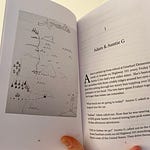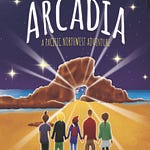Hello Hedge Schoolers,
Last week was a treat. An opportunity to breathe in the deep inquiries of my dear friend Lara. The words tangoing with my eyes. The sounds serenading my ears. As the song of Lara's inquiry sung its way into my heart, I found myself in the liminal space between doing and being. Witnessing the urge to do or be. It was here I noticed the fractures that lay within. The internal compartments I had created over time in response to life's lacerations. As the liminality buoyed me, I found myself drawn to this inquiry from Lara.
What is the best integration of humanness?
There are so many nuances to this question. Firstly, I only know one version of humanness.
Mine. Biased and limited. But solely mine.
The word 'best' jumped out at me. Part destination. Part journey. Also neither.
But the word that drove this question home for me was integration. It implied that I was fragmented. And I am. Often. I'm fragmented when I am out of integrity. I've written about integrity before. Integrity, from the root word integer meaning whole, is how we live into our full shape.
Our complete form.
So why are we fragmented? Why do we Humpty Dumpty ourselves?
In part, protection. A shield from trauma. From grief. From life.
In other parts, projection. Mimicry as a means of social integration. As I watch my kids grow, I notice when they start to notice their differences. Yardsticking their biological hand against their peers, they start to shift away from natural tendencies. Shift towards assimilation. The tectonic plates slowly drifting away from oneness.
We talk openly about fiercely protecting our uniqueness but maybe fragmentation is a part of the process of growth.
Carl Jung would say fragmenting is when we lose touch with ourselves. A form of suffering where we forget the magic of our uniqueness for a time. Jung called the process of collecting the pieces and reassembling them 'Individuation'. Through individuation, we come back to ourselves.
But we must first suffer.
Suffer the divisions.
Suffer the realisation that all is not well.
Suffer the process of coming back to wholeness.
So if it is unavoidable, what does our relationship with suffering look like?
In her book, When Things Fall Apart: Heart Advice for Difficult Times, Pema Chodron explains that suffering should be celebrated. For not celebrating means that we only fear. We resist. We go against the grain. Suffering is one of the three truths. Along with Impermanence and Egolessness, Suffering is a truth of life. We were born through the suffering of our mother. We suffer in death. Not celebrating means that we only honour half the experience. For the suffering of our birth was greeted with both pain and joy. The suffering of our death is both pain and joy.
So to begin my integration, I have to start with my relationship to suffering.
Where am I gripping with white knuckles?
How am I holding on to constructs and narratives that don't actually exist?
It is here I practice renunciation. A practice I learned from Pema Chodron. It is a practice of inquiry. When I can't stand to face what is in my path, can I investigate why I'm going against the grain in the first place. Can I let go and trust that impermanence will flow as it needs.
Effortlessly. Consciously. Surrendering.
Suffering is how we grow. It is how we fracture and fragment.
And how to come back to ourselves again.
Till next time,
Steve
Image Source: https://unsplash.com/photos/mC852jACK1g













Share this post